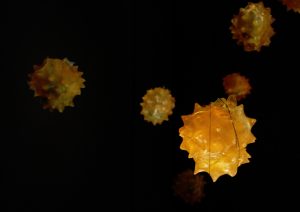What would happen if…
… we had breathalyzer cars?
… all meat was grown in labs?
… teachers were replaced by robots?
Artist David Lisser explored these questions and their spiralling consequences with a number of young co-researchers during a series of workshops that culminated the ‘Future Thinking’ project.
The workshops were developed as the core part of a project which saw the artist meet and interact with a number of researchers from areas across the University, including experts in agriculture, paleoarchaeology, international development, soil science, and meteorology. He also visited the Suttons Seeds collection, part of the University’s special collections

Following these meetings and conversations, David created a host of rubber pollen molecule models which became the central part of a new ‘museum of future artefacts’.
David ran five workshops over two weeks, with different school groups attending each workshop. The school groups came from schools around Berkshire, and were all schools with which the Outreach team have or are developing relationships with for a variety of different interactions with the University.
Workshops were held at the Museum of Rural Life, where the students first got to handle some rather unfamiliar objects from the MERL collection, working out what sort of clues to look for in order to determine their purpose and possible history. Pollen also acts as a sort of artefact holding clues to the history of the earth: virtually indestructible, fossilised pollen molecules can tell us a lot about the probable flora and climate of different parts of the world many millions of years ago.

To start thinking about what artefacts could tell us in future decades, students were introduced to Future Wheels, and generated intensive discussions about the possible consequences of some likely (and more imaginative) future scenarios which were suggested by different researchers from across the University. Based on the worlds they imagined through the Future Wheels, students then created small-scale models of artefacts that might be found from these future worlds, and these were then encased by the rubber pollen capsules to be added to a growing installation in the MERL’s community case.

68 students in total attended the workshops, including students from Addington SEN school. All students engaged brilliantly with the concepts and the creating of models; we were bowled over especially by the level of imagination and creativity applied to the Future Wheels tasks. It seems as if the students had an enjoyable time – 85% fed back that they agreed or strongly agreed with the statement ‘I enjoyed the day’.
The installation of pollen molecules is available to view in the Community Case at MERL until October 2019.
The project was made possible with a grant from the Access Fund and was co-delivered by Impact Development Manager Katie Cooper, Arts Development Officer Miranda Laurence and Outreach and Access Officer Freya Varden.


This is very interesting. I would liveto attend one of these types of workshops.